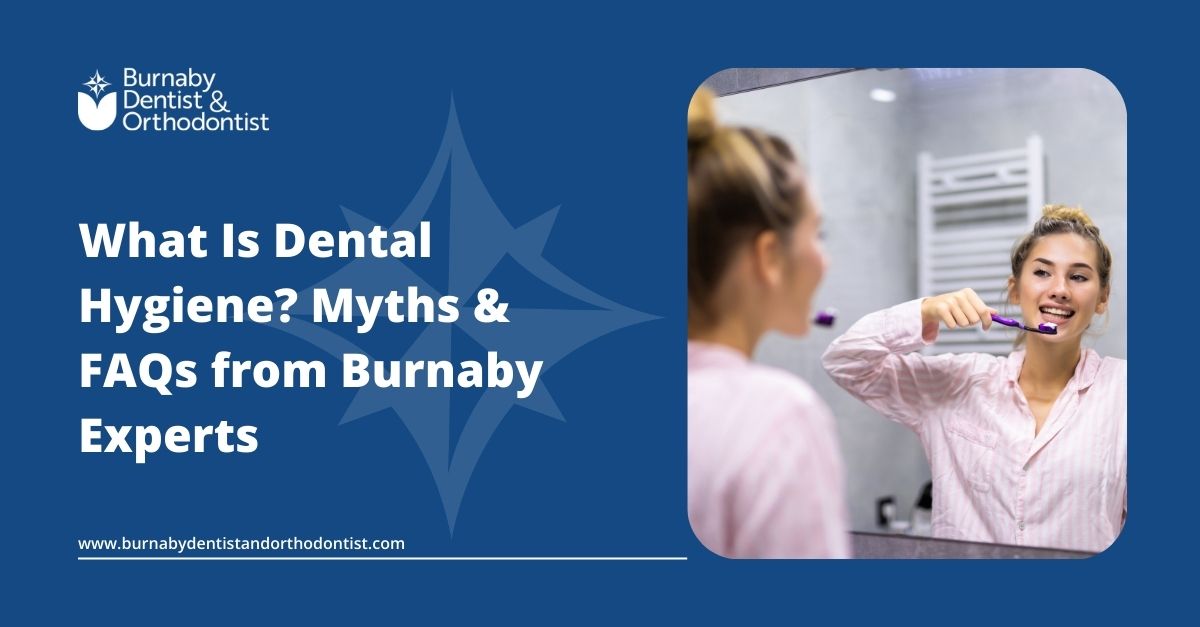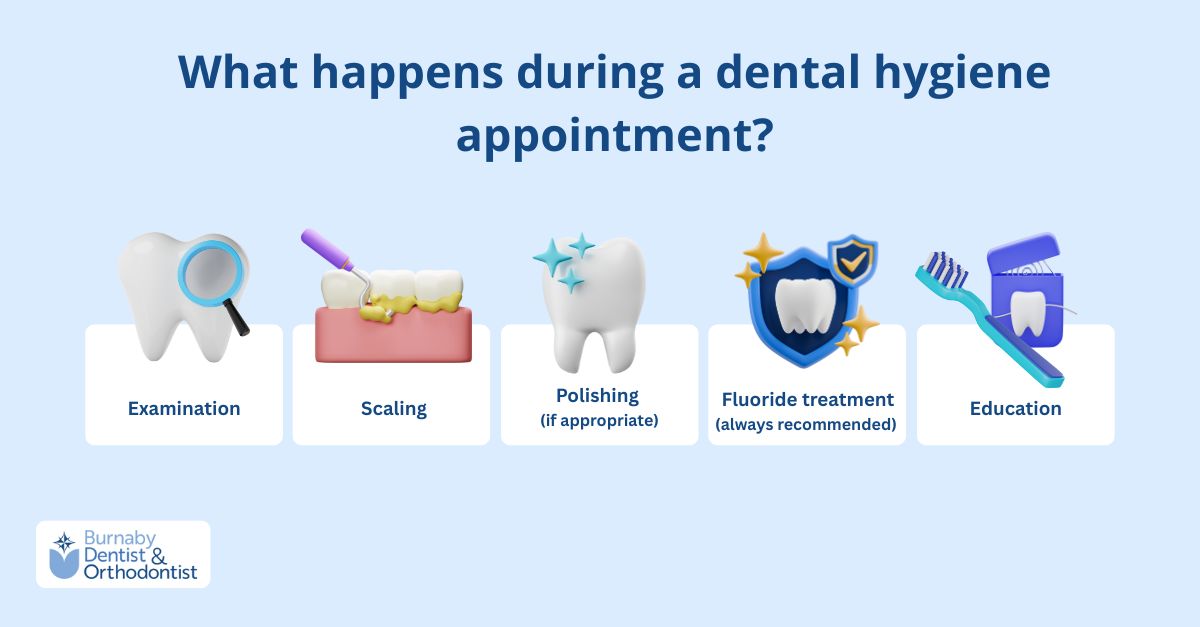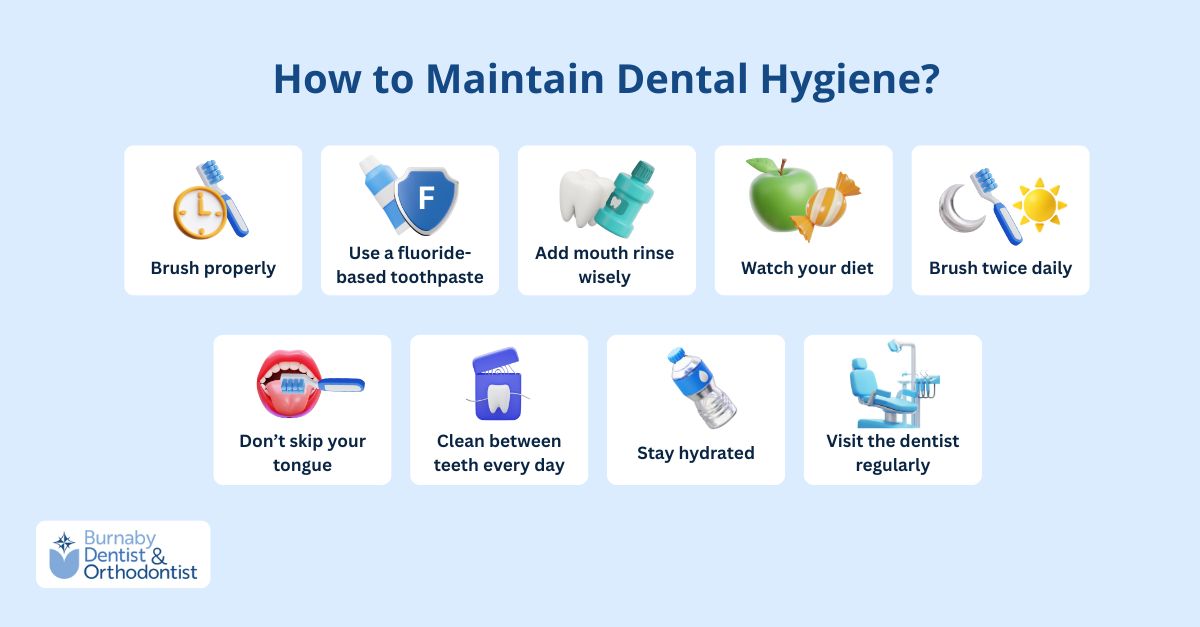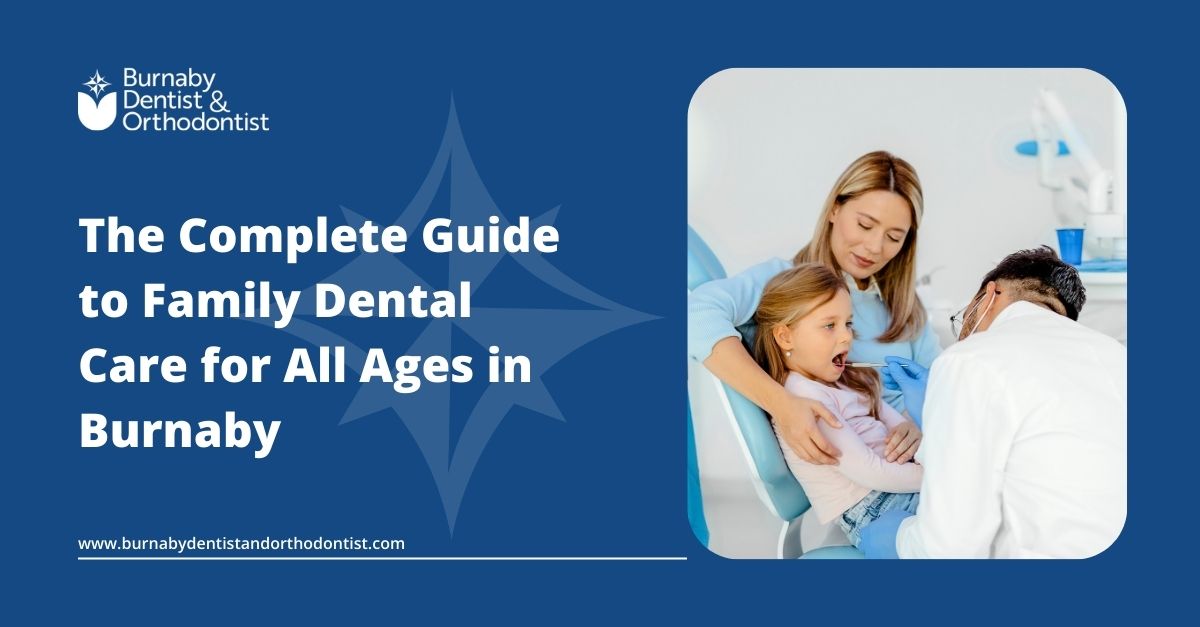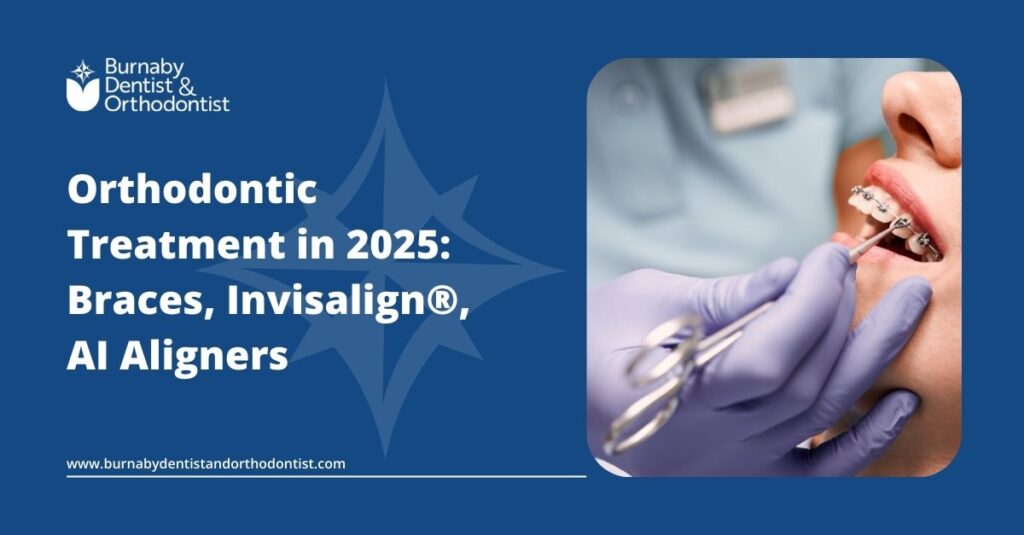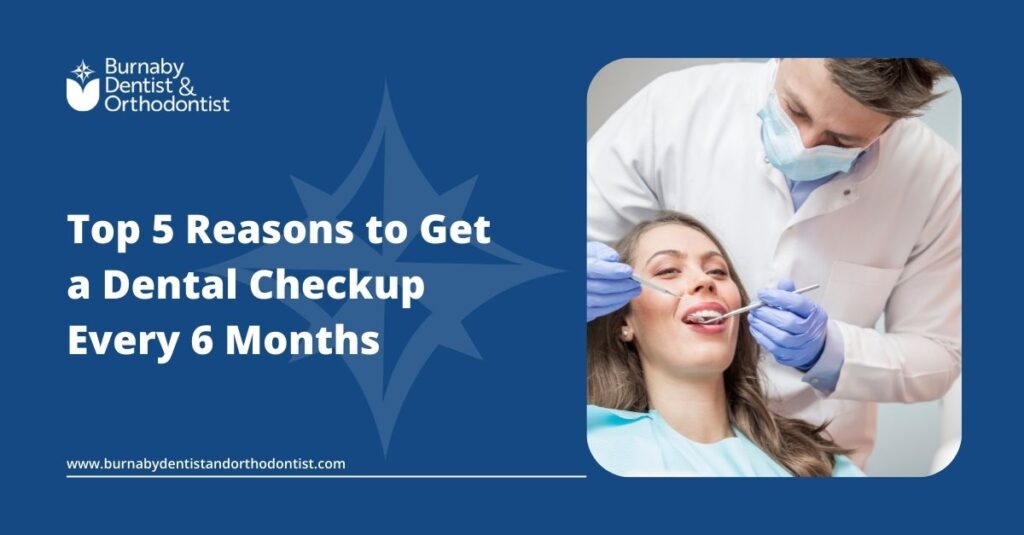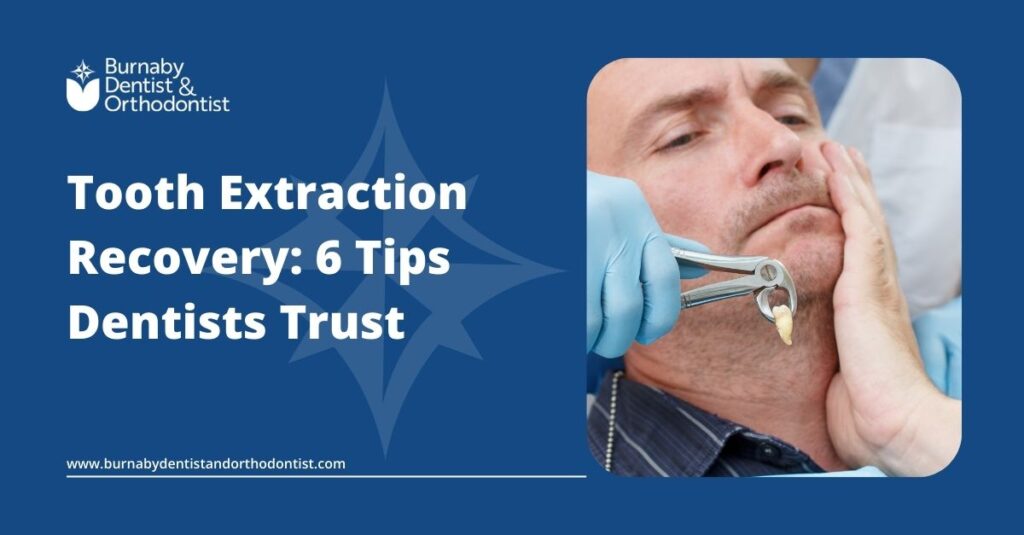When it comes to keeping your smile healthy, dental hygiene is about more than just brushing your teeth twice a day. It’s a combination of daily habits and professional care that protects your teeth, gums, and overall health.
Yet, many people are unsure what dental hygiene really involves—and with so many myths floating around (“Flossing isn’t necessary,” “If my teeth don’t hurt, they must be fine”), it can be hard to know what’s true.
In this guide, our team at Burnaby Dentist & Orthodontist—trusted by families across Metrotown, Brentwood, and surrounding neighbourhoods—answers the most common dental hygiene FAQs, clears up widespread misconceptions, and explains why professional cleanings are just as important as your at-home routine.
What is dental hygiene?
At its core, dental hygiene in Burnaby is the practice of keeping your mouth clean and healthy through both daily care and professional support. It includes the simple habits you do at home, like brushing, flossing, and rinsing, as well as the specialized cleanings and exams performed by a dental hygienist during your visits to the dentist.
It’s important to note that dental hygiene and dental cleaning are related but not identical.
Dental hygiene is the broader concept: everything that contributes to maintaining healthy teeth and gums, from your diet and home routine to regular checkups.
Dental cleaning is one part of that process — the professional removal of plaque and hardened tartar (also known as calculus) that you can’t reach with brushing and flossing alone.
Together, these steps are essential for protecting both your teeth and your gums. Good dental hygiene prevents cavities from forming, stops gum disease from progressing, and reduces the risk of tooth loss later in life.
Beyond your mouth, maintaining oral hygiene also supports your overall health, lowering risks linked to conditions such as heart disease and diabetes.

Begin Your Smile Journey With Dr. Sasan Hadianfar
Why is dental hygiene important?
Practicing good dental hygiene is about more than just keeping your teeth white, it plays a key role in protecting your oral and overall health. Here’s why it matters:
1. Prevents Cavities, Gum Disease, and Tooth Loss
Plaque is a sticky film of bacteria that builds up on teeth every day. Without proper brushing, flossing, and professional cleanings, this bacteria hardens into tartar (calculus), leading to cavities, gum inflammation (gingivitis), and eventually, periodontal disease with associated bone loss.
Over time, untreated gum disease is one of the leading causes of tooth loss in adults. Regular dental hygiene helps stop these problems before they start.
2. Protects Your Overall Health
Your mouth is directly connected to your body’s health. There are strong links between gum disease and systemic conditions such as heart disease, diabetes, respiratory infections, and even complications during pregnancy.
By keeping your gums and teeth healthy, you’re also lowering the risk of serious health issues beyond your smile.
3. Improve Confidence and Quality of Life
Fresh breath, a bright smile, and healthy gums make a huge difference in how you feel about yourself. Poor dental hygiene can cause chronic bad breath, staining, and visible tartar (calculus) buildup, issues that can make people self-conscious in daily interactions.
With consistent care, you’ll not only enjoy a healthier mouth but also greater confidence in both personal and professional settings.
FAQs About Dental Hygiene, Answered by Dentists
Everyone has questions about the best way to care for their teeth and gums, and not all the answers online are accurate. To help clear things up, our dentists and hygienists at Burnaby Dentist & Orthodontist have answered the most common dental hygiene questions we hear from patients.
How often should I get my teeth cleaned?
Most adult patients benefit from a professional dental cleaning every 3 to 4 months, especially when early signs of gum inflammation or tartar buildup are present. This schedule allows your hygienist to remove plaque and tartar (calculus) before they lead to cavities or gum disease.
Patients undergoing Invisalign® treatment in Burnaby, those with a history of gum disease, or individuals with certain health conditions may also require more frequent visits. Your dentist or hygienist will recommend a personalized hygiene schedule based on your needs.
What happens during a dental hygiene appointment?
A typical dental hygiene visit includes:
- Examination – Your hygienist checks your teeth and gums for signs of decay, inflammation, or other oral health concerns.
- Scaling – Plaque and tartar (calculus) are carefully removed using a combination of ultrasonic and hand instruments, even in hard-to-reach areas.
- Polishing (if appropriate) – In some cases, teeth are polished to remove surface stains and smooth the enamel.
- Fluoride treatment – Fluoride is always recommended to help strengthen enamel and prevent cavities, but may not be performed at every visit depending on your needs.
- Education – Your hygienist will share practical tips on brushing, flossing, and maintaining good oral hygiene at home.
It’s a simple, comfortable process designed to leave your teeth feeling refreshed and your oral health on track.
Is professional cleaning necessary if I brush and floss?
Yes, even with excellent home care, there are areas your toothbrush and floss can’t reach. Over time, plaque hardens into tartar (calculus), which cannot be removed at home.
Only professional instruments can safely clear it away. Skipping professional cleanings allows tartar (calculus) to cause gum irritation, cavities, and bad breath.
Can dental hygiene prevent gum disease?
Absolutely. Gum disease starts when plaque builds up along the gumline and isn’t removed. Regular brushing, flossing, and professional cleanings keep gums healthy and helps prevent gingivitis (the earliest stage of gum disease).
Left untreated, gingivitis can progress to periodontitis, which may cause gum recession and tooth loss. Consistent dental hygiene is the best defense.
What’s the difference between a dentist and a dental hygienist?
Dental hygienists focus on preventive care and can also diagnose periodontal disease. They perform cleanings, apply fluoride, take X-rays, and educate patients on oral health.
Dentists are responsible for diagnosing and treating a wide range of dental problems. They handle fillings, crowns, extractions, and overall oral health management.
Think of hygienists as your first line of defense in preventing and detecting issues, while dentists step in when treatment or restoration is needed.
Does dental hygiene affect bad breath?
Yes. Persistent bad breath (halitosis) is often caused by bacteria in the mouth. When plaque and tartar (calculus) build up, they release odors and irritate the gums. Regular dental cleanings, along with brushing your tongue and staying hydrated, significantly reduce bad breath.
How to Maintain Dental Hygiene?
Keeping your mouth healthy doesn’t have to be complicated, it’s about building simple habits and being consistent:
- Brush twice daily: once in the morning and again before bed, to clear away the day’s buildup.
- Brush properly: spend at least two minutes brushing in small, circular motions to remove plaque effectively.
- Don’t skip your tongue: bacteria collect here too, often causing bad breath and other oral issues.
- Use a fluoride-based toothpaste: it strengthens enamel and helps fight cavities.
- Clean between teeth every day: whether with floss or interdental brushes, this step removes trapped food and bacteria.
- Add mouth rinse wisely: a fluoride rinse can help protect teeth, but it’s best used at a separate time from brushing.
- Stay hydrated: drinking plenty of water keeps your mouth moist and helps wash away debris.
- Watch your diet: reduce sugary snacks and acidic drinks, which wear down enamel over time.
- Visit the dentist regularly: professional cleanings and checkups (twice a year, or more if needed) prevent issues before they become serious.
Together, these habits form the foundation of lifelong dental health, protecting both your teeth and gums while keeping your smile bright and fresh.
Common Dental Hygiene Myths — Debunked
Taking care of your teeth seems straightforward, but misinformation can lead to habits that do more harm than good. To help clear things up, our Burnaby dentists break down some of the most common dental myths and explain the facts behind them.
Myth 1: Bleeding gums are normal
If your gums bleed when you brush or floss, it’s not something to ignore. This is an early warning sign of gum disease, not a sign that you should stop brushing. Consistent, gentle care and professional cleanings are essential to restoring gum health.
Myth 2: Flossing isn’t necessary if you brush well
Brushing only cleans the outer surfaces of your teeth. Plaque and food debris that collect between teeth can only be removed with floss or interdental tools. Skipping this step leaves you at risk for cavities and gum problems.
Myth 3: Whitening toothpaste can actually whiten teeth
While whitening toothpaste may reduce surface stains, it doesn’t change the natural shade of your teeth. For a noticeable whitening effect, professional treatments at your dentist’s office are the safe and effective option.
Myth 4: Brushing too often wears down your enamel
It’s not brushing frequency that’s the issue, but brushing technique. Using a hard-bristled brush or scrubbing aggressively can damage enamel.
Myth 5: Sensitive teeth always mean cavities
Tooth sensitivity can be linked to cavities, but it’s not the only cause. Worn enamel, exposed roots, or even gum disease can also be to blame.
Myth 6: Baby teeth don’t matter since they fall out
Healthy baby teeth are essential for a child’s comfort, nutrition, and proper development of adult teeth. Cavities in primary teeth can cause pain, infection, and even impact the alignment and development of permanent teeth later on.
Myth 7: Mouthwash is only for freshening breath
A good mouth rinse can do more than mask odors, fluoride mouthwashes can help strengthen enamel and reduce bacteria levels in your mouth. Used properly, it’s a valuable addition to your hygiene routine.
Myth 8: Dental visits are only needed when you’re in pain
Many dental issues, including cavities and gum disease, develop silently without causing discomfort at first. Regular checkups catch problems early, often saving you from more complex and costly treatment later.
Myth 9: Dental health doesn’t affect overall health
Your mouth is closely connected to the rest of your body. Gum disease has been linked to conditions like heart disease, diabetes, and stroke.
Conclusion
Dental hygiene is the foundation of a healthy smile, strong gums, and better overall wellness. By brushing and flossing daily, choosing tooth-friendly foods, and seeing your dentist regularly, you can prevent problems before they start—and enjoy lasting confidence in your oral health.
At Burnaby Dentist & Orthodontist, one of the trusted family dental centres in Burnaby, we provide personalized, judgment-free hygiene care in a calm, modern setting. Whether you live near Metrotown, Brentwood, or anywhere in Burnaby, our friendly team is here to support your family’s dental wellness with gentle cleanings and expert preventive guidance.
Ready to feel great about your smile?
Book your next dental hygiene visit today and take the next step toward a cleaner, healthier mouth—for you or your loved ones.
What is included in dental hygiene?

Dental hygiene includes daily care like brushing, flossing, and rinsing, plus professional cleanings, exams, and preventive treatments from your dentist or hygienist.
Is professional teeth cleaning necessary?

Yes, even with good home care, only a hygienist can remove hardened tartar (calculus) and detect issues early before they become serious.
Can poor dental hygiene affect your overall health?

Yes — gum disease is linked to heart disease, diabetes, and other health problems, showing that oral health impacts the whole body.

